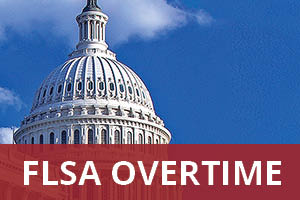by CUPA-HR | March 15, 2023
Each month, CUPA-HR General Counsel Ira Shepard provides an overview of several labor and employment law cases and regulatory actions with implications for the higher ed workplace. Here’s the latest from Ira.
Court of Appeals May Narrow LBGTQ Rights Under Title VII
The 5th U.S. Circuit Court of Appeals (covering Texas, Louisiana and Mississippi) recently heard oral argument over a U.S. District Court judge’s ruling that private businesses may assert a religious exemption to bias claims brought by LBGTQ workers under federal anti-discrimination statutes. The trial court had granted summary judgment that religious employers objecting to dress codes, bathroom policies or hiring of LBGTQ employees are protected by the First Amendment (Braidwood Management v. EEOC (5th Cir. No 22-10145, oral ARG 2/7/23).
If the trial court decision is upheld, it would blunt the reach of the recent Supreme Court decision in Bostock v. Clayton County, which held that LBGTQ workers can sue employers for job discrimination under Title VII based on gender identity or sexual orientation. The plaintiffs in the case are a Texas based healthcare provider and a Church. We will follow developments in this case.
Qualifying Temporary Workers Granted Pay-Parity Rights Equal to Full-Time Employees Under New Jersey State Statute
New Jersey-based employers will have to grant certain temporary employees hired in the state pay and benefits equal to what the employer pays full-time direct-hire employees. The new law, recently signed by the governor (effective 180 days after the 2/7/23 signing), creates a “bill of rights” for many temporary employees and applies to specific New Jersey employers. The law applies only to the manufacturing, warehousing and logistics, food service, construction, building security and maintenance, cleaning, and landscaping industries. The statute does not cover healthcare workers, business and finance professionals, salespeople, and information security and technology staff. The statute does apply to temporary staffing agencies.
New Jersey is joining California, Illinois and Massachusetts in adopting a statute protecting temporary employees. However, the New Jersey statute goes a step further than the other states in requiring pay and benefits equivalent to similarly situated full time employees in the industries and areas described above.
Offensive Music in Workplace Brings Sex Harassment/Hostile Environment Litigation
Bloomberg reports multiple filings of sex harassment, hostile work environment lawsuits based on claims that offensive music being played in the workplace creates a sexually hostile work environment. The multiple litigation filings involve manufacturing and warehouse employees. The employees are complaining that obscene and misogynistic rap music was continually played in the workplace over the objection of the complaining employees. The complaints allege that managers and other employees regularly played vulgar music and ignored the complaints and objections of offended employees. The allegations state that allowing the music to continue created a sexually hostile work environment, which is actionable under Title VII.
Employers can avoid such litigation by establishing and enforcing policies that forbid sexually or racially offensive content in the workplace.
Tenured Public School Teacher’s Termination for Unprofessional Social Media Posts Reversed — Court Holds Tenure Entitled Her to a Warning and Opportunity to Remedy
A tenured Illinois public school history teacher who was terminated after posting publicly available “unprofessional” and “disrespectful” social media posts had her termination reversed by an Illinois appellate court. The termination had been affirmed by the trial court. The teacher claimed not to realize that her posts were public as opposed to being distributed only to “friends” on Facebook.
Among other posts, the teacher shared a Facebook post from a group called Bored Teachers which stated, “I can think of no better form of birth control than to have people observe my class for a day.” In another post she described a student’s parents as “clearly crazy” and “nuts.” The teacher was terminated for making unprofessional remarks about students on Facebook. The head of HR testified that the plaintiff was not remorseful and thought the posts were therapeutic.
The Illinois appellate court concluded that the plaintiff’s posts were “clearly foolish” and “unprofessional.” Nonetheless the appellate court concluded that the Illinois state statute afforded tenured teachers the right to warning and a chance to remedy their transgressions (Kelleher v. Illinois State Board of Education (Ill App. Ct. 1st Dist. No. 1-22-0058, Order 2/14/23)).
EEOC Commissioner Charges at Record High
EEOC commissioner charges for fiscal 2022 jumped to a record high of 22, up from just 3 in the previous year and the highest number since records have been kept on annual commissioner charges. A commissioner charge is one filed by an EEOC commissioner raising a potential legal issue. The vast majority of EEOC charges are filed by alleged victims.
Commentators point out that the commissioner charge increase is likely due to a partisan block of action at the EEOC. Under the Biden administration, the EEOC had a Democrat chair and a Republican majority of members (three Republicans, two Democrats) until November 2022. Currently, the commission has a Democrat chair and a vacant seat, leaving it with two Democrat members and two Republican members. The filling of the open commission seat is still on hold due to blockage of the nomination process in Congress.
OFCCP Rescinds Trump Administration Religious Carve-Out Allowing Federal Contractors to Ignore Anti-Discrimination Obligations Based on Faith
The OFCCP announced new regulations on February 28, 2023, rescinding the Trump administration regulations allowing government contractors to ignore certain anti-discrimination obligations based on their faith. The new regulations bring back the prior standard, which had been in place for nearly two decades, and do not allow the defense. The new regulations will be published shortly and effective 30 days after publication. The Trump administration rule, which will be revoked, faced continued opposition from civil rights groups and LBGTQ advocates. This rule applies to the OFCCP enforcement of antidiscrimination rules under Executive Order 11246, applicable to all federal government contractors.
Share This Article:




